By Jim Davis - Florida Catholic
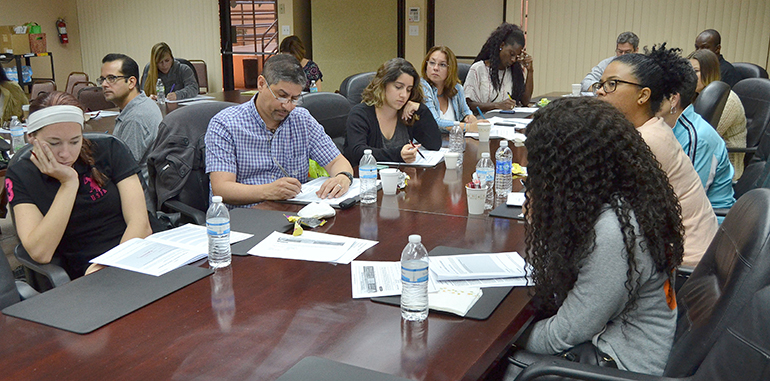
Photographer: JIM DAVIS | FC
Participants listen to Jan Rayburn as they follow in their workbooks during a Virtus workshop.
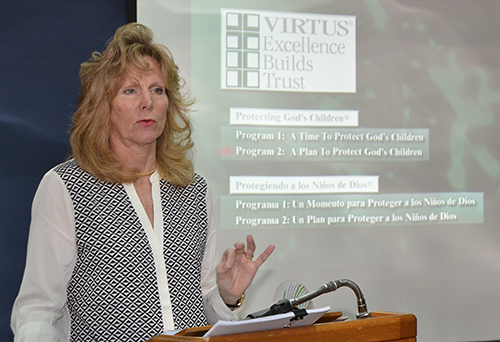
Photographer: JIM DAVIS | FC
Jan Rayburn, Safe Environment coordinator for the Archdiocese of Miami, speaks at a Virtus workshop.
MIAMI SHORES | With its warning of "disturbing" stories that may cause a viewer to "feel the need to excuse yourself," it's not a video you'd usually see at the archdiocesan Pastoral Center. But then, sexual abuse is not a typical topic.
Yet it's one the archdiocese is facing head-on — more than 250 times a year — in its Virtus/Protecting God's Children workshops. A combination of videos and discussions, the workshops have trained about 150,000 people in the archdiocese since 2003.
The three-hour workshop is required for anyone who works with the archdiocese — clergy and laity, employees and volunteers alike. As in a recent session, the participants watch the videos, hear lectures and take part in talks, guided by an 11-page workbook.
"It's not comfortable talking about this," acknowledged Jan Rayburn, archdiocesan Safe Environment coordinator, at a workshop in March. "But if we don’t, who wins?"
Her 15 listeners remained silent; they all knew the answer.
The first of the two 33-minute videos introduced a variety of victims, including a 10-year-old boy, a 12-year-old girl, a young man and a young woman. They told their stories of how adults gained their trust, and often that of their parents and teachers, then abused them.
The second video offered ideas on how to keep children separate from those who may wish to harm them, such as screening volunteers and locking unused rooms.
"Fascinating ... scary," was the reaction of Jonelle Pollard during a break. She's taking the workshop for a psychology class at Barry University. "I have nine nieces and nephews. This makes you want to pay more attention."
Produced under the brand name Virtus — from the Latin word for "valor, moral strength, excellence, worth" — the training program was created by the National Catholic Risk Retention Group to attune adults to the dangers of child sex abuse. The group found that many schools had programs to empower children against abuse, but less was done for adults.
The program has been adopted by more than 100 dioceses that have trained more than 2 million adult Catholics since 2002.
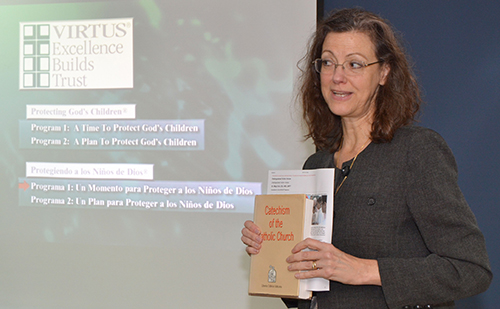
Photographer: JIM DAVIS | FC
Lisa Pinto, senior director of human resources for the Archdiocese of Miami, speaks at a Virtus workshop.
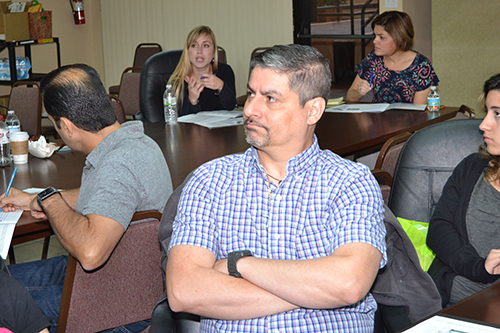
Photographer: JIM DAVIS | FC
Javier Cardone, center, listens during a Virtus workshop.
But when the archdiocese started requiring Virtus in 2003, Rayburn met a lot of resistance. She sympathized but maintained the program is necessary for everyone who has access to children, including volunteers at social events such as church carnivals.
"Compliance is hard, but if an event attracts children, it may also attract predators," she said.
For Javier Cardona, a member of St. John XXIII Church in Miramar, the biggest eye-opener of the day was that there's no standard profile of a molester.
"He could be anybody," said Cardona, who has applied to become an extraordinary minister of holy Communion. "You can't just spot him. It might even be a woman."
He also saw the value in taking the session even though he won't likely have contact with children himself. "I have two boys, 20 and 18, so you could say they're past that age. But I'm in a community, and my sons are going to be fathers one day. So it's a never-ending work."
Cardona's niece, Yimalisse Nazario, said she saw little new material in the videos: She worked a fellowship this past summer counseling victims of human trafficking.
"It was a refresher for me — good, accurate information," said Nazario, a Dania resident who plans to work as a mentor for the Refugee Minors Program of archdiocesan Catholic Charities. "Within our community, people need to be more aware of these things — to see them differently."
Virtus is more hands-on than programs at other dioceses, some of which allow training online. Rayburn said experts agree that many victims of sexual abuse never report it. She explained that the archdiocese wanted the training sessions to be personal, in order “to promote healing as well as to protect."
Healing and protection are also priorities for Lisa Pinto, senior director of human resources for the archdiocese. In her talk at the March workshop, she pointed out passages in the Church catechism on the parental responsibility for education and protection of children, and to "avoid compromising or degrading influences."
"And we are the hands and feet of parents," Pinto said. "Because of God's love and plan for us, we are called to responsibility. The protection of the child is paramount."
The three-hour workshop is just the first step in Virtus training, Rayburn said. Each participant gets monthly e-mail bulletins. Her eventual goal is to have a local coordinator in every parish and school in the archdiocese making sure everyone is fingerprinted and background-checked, and submitting annual compliance reports.
"We need to change the culture with ongoing education," Rayburn said.
But after hundreds of workshops with thousands of people, one question remains: How to tell if the process is working? Like other such programs, Virtus succeeds if something — in this case, abuse — doesn't happen.
"You may never see the good you're doing," Rayburn concedes. But sometimes she gets a hint.
After the recent session in March, a woman approached and said she, too, had been a victim. "She said she was grateful for the program," Rayburn said.
That happens at least once per workshop, she added.
Related stories:
April is National Child Abuse Prevention Month
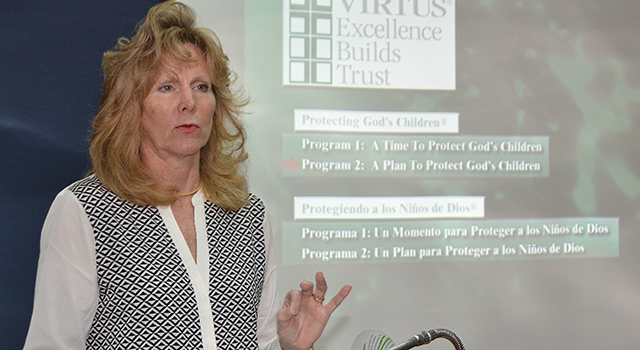

Comments from readers